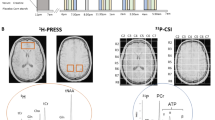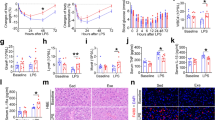Abstract
Background/Objectives:
Considering the importance of glucose as a brain substrate, the postprandial rate of glucose delivery to the blood could be expected to affect cognitive functions. The purpose was to evaluate to what extent the rate of glucose absorption affected measures of cognitive performance in the postprandial period. In addition, cognitive performance was evaluated in relation to individual glucoregulation.
Subjects/Methods:
A white wheat bread (WWB) enriched with guar gum (G-WWB) with the capacity to produce a low but sustained blood glucose net increment was developed. The G-WWB was evaluated in the postprandial period after breakfast with respect to effects on cognitive function (working memory and selective attention (SA)) in 40 healthy adults (49–71 years, body mass index 20–29 kg/m2), using a high glycaemic index WWB for comparison in a randomised crossover design.
Results:
The G-WWB improved outcome in the cognitive tests (SA test) in the later postprandial period (75–225 min) in comparison with the WWB (P<0.01). Subjects with better glucoregulation performed superior in cognitive tests compared with subjects with worse glucoregulation (P<0.05).
Conclusions:
Beneficial effects on cognitive performance were observed with the G-WWB in the late postprandial period. The positive effect is suggested to emanate from improved insulin sensitivity, possibly in a combination with an enhanced neural energy supply. The results highlight the importance of carbohydrate foods that induces a low but sustained blood glucose profile in enhancing postprandial cognitive functions.
This is a preview of subscription content, access via your institution
Access options
Subscribe to this journal
Receive 12 print issues and online access
$259.00 per year
only $21.58 per issue
Buy this article
- Purchase on Springer Link
- Instant access to full article PDF
Prices may be subject to local taxes which are calculated during checkout

Similar content being viewed by others
References
Scholey AB, Laing S, Kennedy DO . Blood glucose changes and memory: effects of manipulating emotionality and mental effort. Biol Psychol 2006; 71: 12–19.
Perlmuter LC, Shah PH, Flanagan BP, Surampudi V, Kosman Y, Singh SP et al. Rate of peripheral glucose change during cognitive testing predicts performance in diabetes mellitus. J Diabetes 2009; 1: 43–49.
Scholey AB, Harper S, Kennedy DO . Cognitive demand and blood glucose. Physiol Behav 2001; 73: 585–592.
McNay EC, Fries TM, Gold PE . Decreases in rat extracellular hippocampal glucose concentration associated with cognitive demand during a spatial task. Proc Natl Acad Sci USA 2000; 97: 2881–2885.
McNay EC, McCarty RC, Gold PE . Fluctuations in brain glucose concentration during behavioral testing: dissociations between brain areas and between brain and blood. Neurobiol Learn Mem 2001; 75: 325–337.
Granfeldt Y, Nyberg L, Bjorck I . Muesli with 4 g oat beta-glucans lowers glucose and insulin responses after a bread meal in healthy subjects. Eur J Clin Nutr 2008; 62: 600–607.
Wolever TM . Carbohydrate and the regulation of blood glucose and metabolism. Nutr Rev 2003; 61: S40–S48.
Nilsson AC, Ostman EM, Granfeldt Y, Bjorck IM . Effect of cereal test breakfasts differing in glycemic index and content of indigestible carbohydrates on daylong glucose tolerance in healthy subjects. Am J Clin Nutr 2008; 87: 645–654.
Östman EM, Liljeberg Elmstahl HG, Bjorck IM . Barley bread containing lactic acid improves glucose tolerance at a subsequent meal in healthy men and women. J Nutr 2002; 132: 1173–1175.
Gonzales MM, Tarumi T, Miles SC, Tanaka H, Shah F, Haley AP . Insulin sensitivity as a mediator of the relationship between BMI and working memory-related brain activation. Obesity (Silver Spring) 2010; 18: 2131–2137.
Zhao WQ, Alkon DL . Role of insulin and insulin receptor in learning and memory. Mol Cell Endocrinol 2001; 177: 125–134.
Ryan CM, Geckle M . Why is learning and memory dysfunction in type 2 diabetes limited to older adults? Diabetes Metab Res Rev 2000; 16: 308–315.
Gallacher JE, Pickering J, Elwood PC, Bayer AJ, Yarnell JW, Ben-Shlomo Y . Glucoregulation has greater impact on cognitive performance than macro-vascular disease in men with type 2 diabetes: data from the Caerphilly Study. Eur J Epidemiol 2005; 20: 761–768.
Strachan MW, Deary IJ, Ewing FM, Frier BM . Is type II diabetes associated with an increased risk of cognitive dysfunction? A critical review of published studies. Diabetes Care 1997; 20: 438–445.
Taylor VH, MacQueen GM . Cognitive dysfunction associated with metabolic syndrome. Obes Rev 2007; 8: 409–418.
Yaffe K, Weston AL, Blackwell T, Krueger KA . The metabolic syndrome and development of cognitive impairment among older women. Arch Neurol 2009; 66: 324–328.
Nilsson A, Radeborg K, Bjorck I . Effects of differences in postprandial glycaemia on cognitive functions in healthy middle-aged subjects. Eur J Clin Nut 2009; 63: 113–120.
Lamport DJ, Lawton CL, Mansfield MW, Dye L . Impairments in glucose tolerance can have a negative impact on cognitive function: a systematic research review. Neurosci Biobehav Rev 2009; 33: 394–413.
Benton D, Ruffin MP, Lassel T, Nabb S, Messaoudi M, Vinoy S et al. The delivery rate of dietary carbohydrates affects cognitive performance in both rats and humans. Psychopharmacology (Berl) 2003; 166: 86–90.
Kaplan RJ, Greenwood CE, Winocur G, Wolever TM . Cognitive performance is associated with glucose regulation in healthy elderly persons and can be enhanced with glucose and dietary carbohydrates. Am J Clin Nutr 2000; 72: 825–836.
Dye L, Gilsenan MB, Quadt F, Martens VE, Bot A, Lasikiewicz N et al. Manipulation of glycemic response with isomaltulose in a milk-based drink does not affect cognitive performance in healthy adults. Mol Nutr Food Res 2010; 54: 506–515.
Daneman M, Carpenter PA . Individual differences in working memory and reading. J Verbal Learn Verbal Behav 1980; 19: 450–466.
Radeborg K, Briem V, Hedman LR . The effect of concurrent task difficulty on working memory during simulated driving. Ergonomics 1999; 42: 767–777.
Ingwersen J, Defeyter MA, Kennedy DO, Wesnes KA, Scholey AB . A low glycaemic index breakfast cereal preferentially prevents children's cognitive performance from declining throughout the morning. Appetite 2007; 49: 240–244.
Benton D, Maconie A, Williams C . The influence of the glycaemic load of breakfast on the behaviour of children in school. Physiol Behav 2007; 92: 717–724.
Nabb S, Benton D . The influence on cognition of the interaction between the macro-nutrient content of breakfast and glucose tolerance. Physiol Behav 2006; 87: 16–23.
Benton D, Nabb S . Breakfasts that release glucose at different speeds interact with previous alcohol intake to influence cognition and mood before and after lunch. Behav Neurosci 2004; 118: 936–943.
Rosén LA, Ostman EM, Bjorck IM . Effects of cereal breakfasts on postprandial glucose, appetite regulation and voluntary energy intake at a subsequent standardized lunch; focusing on rye products. Nutr J 2011; 10: 7.
Mahoney CR, Taylor HA, Kanarek RB, Samuel P . Effect of breakfast composition on cognitive processes in elementary school children. Physiol Behav 2005; 85: 635–645.
Micha R, Rogers PJ, Nelson M . The glycaemic potency of breakfast and cognitive function in school children. Eur J Clin Nutr 2010; 64: 948–957.
Winocur G, Greenwood CE, Piroli GG, Grillo CA, Reznikov LR, Reagan LP et al. Memory impairment in obese Zucker rats: an investigation of cognitive function in an animal model of insulin resistance and obesity. Behav Neurosci 2005; 119: 1389–1395.
Marfella R, Quagliaro L, Nappo F, Ceriello A, Giugliano D . Acute hyperglycemia induces an oxidative stress in healthy subjects. J Clin Invest 2001; 108: 635–636.
Head E . Oxidative damage and cognitive dysfunction: antioxidant treatments to promote healthy brain aging. Neurochem Res 2009; 34: 670–678.
Nilsson AC, Ostman EM, Holst JJ, Bjorck IM . Including indigestible carbohydrates in the evening meal of healthy subjects improves glucose tolerance, lowers inflammatory markers, and increases satiety after a subsequent standardized breakfast. J Nutr 2008; 138: 732–739.
Sparkman NL, Buchanan JB, Heyen JR, Chen J, Beverly JL, Johnson RW . Interleukin-6 facilitates lipopolysaccharide-induced disruption in working memory and expression of other proinflammatory cytokines in hippocampal neuronal cell layers. J Neurosci 2006; 26: 10709–10716.
Micha R, Rogers PJ, Nelson M . Glycaemic index and glycaemic load of breakfast predict cognitive function and mood in school children: a randomised controlled trial. Br J Nutr 2011; 106: 1552–1561.
Franz CE, O’Brien RC, Hauger RL, Mendoza SP, Panizzon MS, Prom-Wormley E et al. Cross-sectional and 35-year longitudinal assessment of salivary cortisol and cognitive functioning: the Vietnam Era Twin Study of Aging. Psychoneuroendocrinology 2011; 36: 1040–1052.
Piroli GG, Grillo CA, Reznikov LR, Adams S, McEwen BS, Charron MJ et al. Corticosterone impairs insulin-stimulated translocation of GLUT4 in the rat hippocampus. Neuroendocrinology 2007; 85: 71–80.
Acknowledgements
This work has been supported by the Antidiabetic Food Centre (AFC), a VINNOVA VINN Excellence Center at Lund University, Sweden.
Author information
Authors and Affiliations
Corresponding author
Ethics declarations
Competing interests
The authors declare no conflict of interest.
Additional information
Supplementary Information accompanies the paper on European Journal of Clinical Nutrition website
Supplementary information
Rights and permissions
About this article
Cite this article
Nilsson, A., Radeborg, K. & Björck, I. Effects on cognitive performance of modulating the postprandial blood glucose profile at breakfast. Eur J Clin Nutr 66, 1039–1043 (2012). https://doi.org/10.1038/ejcn.2012.80
Received:
Revised:
Accepted:
Published:
Issue Date:
DOI: https://doi.org/10.1038/ejcn.2012.80
Keywords
This article is cited by
-
Bioactive Properties of Bread Formulated with Plant-based Functional Ingredients Before Consumption and Possible Links with Health Outcomes After Consumption- A Review
Plant Foods for Human Nutrition (2022)
-
Impact of lunch with carbohydrates differing in glycemic index on children's cognitive functioning in the late postprandial phase: a randomized crossover study
European Journal of Nutrition (2022)
-
Short-term effects of carbohydrates differing in glycemic index (GI) consumed at lunch on children’s cognitive function in a randomized crossover study
European Journal of Clinical Nutrition (2020)
-
Impact of rye-based evening meals on cognitive functions, mood and cardiometabolic risk factors: a randomized controlled study in healthy middle-aged subjects
Nutrition Journal (2018)
-
Baseline glucoregulatory function moderates the effect of dairy milk and fruit juice on postprandial cognition in healthy young adults
European Journal of Nutrition (2018)



